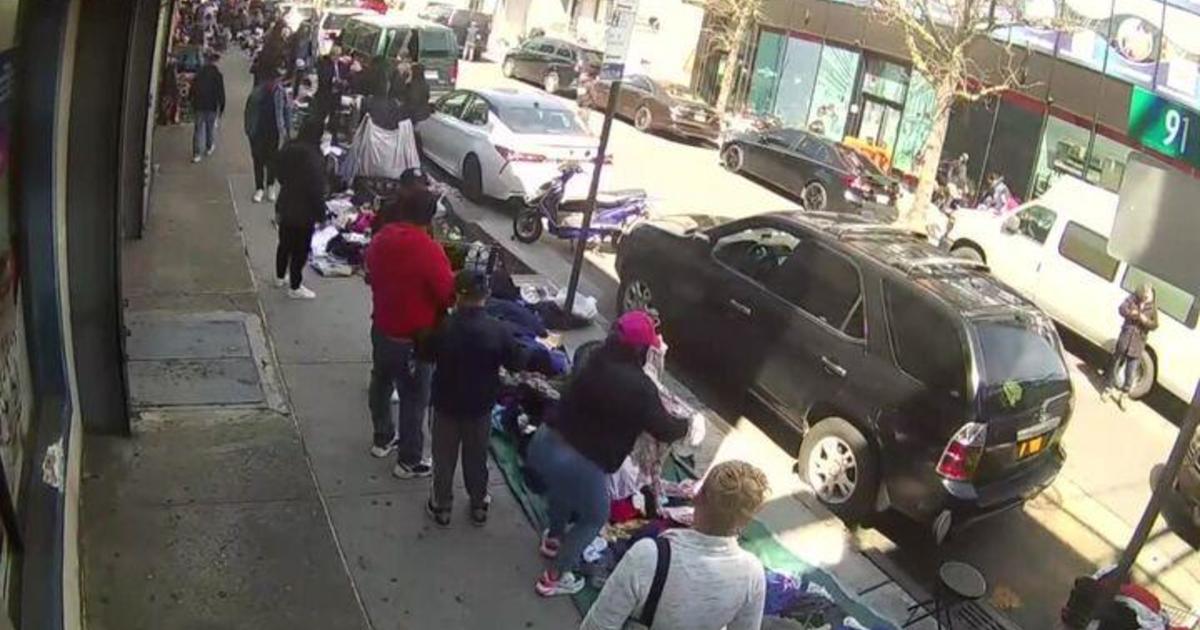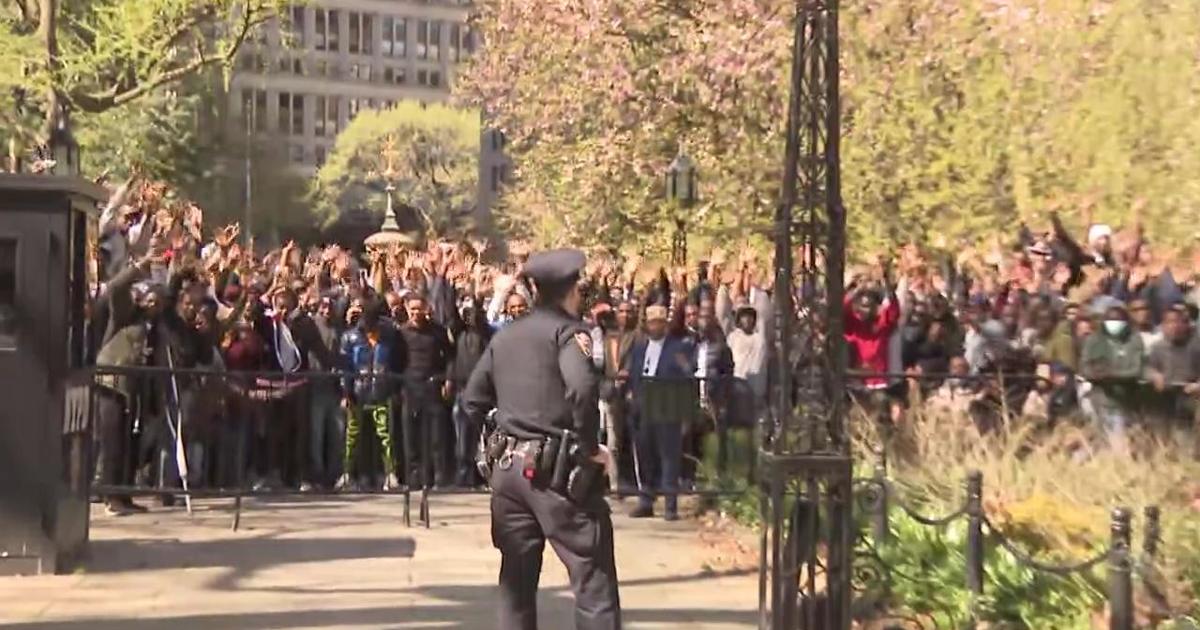Ex-IMF Boss Strauss-Kahn Spends Day With Wife In NYC
NEW YORK (AP) -- Former International Monetary Fund chief Dominique Strauss-Kahn spent his first day of freedom from house arrest in a sexual-assault case by ducking out of his rented townhouse with his wife on Saturday, returning a few hours later and heading quickly back inside.
Strauss-Kahn, whose house arrest was lifted Friday following concerns about the credibility of a hotel maid who accused him of trying to rape her, had left the house in Manhattan's Tribeca neighborhood with his wife, Anne Sinclair, just after 2 p.m. Saturday. They glanced at a crowd of reporters across the street, then climbed into the back seat of a black luxury sedan, which sped off down the cobblestoned street followed by a second black sedan. Their destination was unknown.
The couple returned about three hours later, stepping from a vehicle outside the home.
Strauss-Kahn has been accused by the maid of trying to rape her in May. Prosecutors told a judge on Friday they had discovered serious problems with the maid's credibility. The judge subsequently lifted his house arrest, allowing him to travel in the U.S. but not abroad.
In a dramatic turn of events, the Manhattan district attorney's office revealed that the 32-year-old hotel maid had committed a host of minor frauds to better her life in the U.S. since arriving in the country seven years ago, including lying on immigration paperwork, cheating on her taxes and misstating her income so she could live in an apartment reserved for the poor.
Days after Strauss-Kahn's arrest, the maid made a telephone call to a significant other who was incarcerated in Arizona, and that also raised suspicions, said a law enforcement official with knowledge of the investigation. The official spoke to The Associated Press on condition of anonymity because the official was not authorized to speak publicly about the case.
In a letter to Strauss-Kahn's lawyers, prosecutors also said she had misrepresented what she did immediately after the time she claims Strauss-Kahn attacked her -- instead of fleeing his luxury suite to a hallway and waiting for a supervisor, she went to clean another room and then returned to clean Strauss-Kahn's suite before reporting the encounter.
That change in her story, and the revelations about her past, weren't enough to kill the case entirely, but prosecutors acknowledged their position had been shaken and agreed to a defense request that Strauss-Kahn, often called DSK, be freed immediately from house arrest.
The revelations in a case once considered iron-clad came as a shock; prosecutors and police had said repeatedly that the hotel maid was found to be a credible witness.
Strauss-Kahn, who resigned his post at the powerful global lending organization, has denied the charges. He is due back in court on July 18. His attorney, Benjamin Brafman, said he believes his client will be vindicated.
Linda Fairstein, who oversaw the sex crimes prosecution unit in the Manhattan district attorney's office for 25 years, said rape cases are "especially difficult" to try.
"But they are nearly impossible to try when you find out the witness has already lied to you," she said. "The prosecutors and police, they took her word over the word of one of the most powerful men in the financial world."
Investigators have gathered forensic evidence in the case, including traces of Strauss-Kahn's semen found on the woman's work uniform, but that evidence alone isn't enough, said Fairstein, now a crime novelist.
"The DNA clearly suggests there was some kind of sexual exchange between DSK and the woman, but it tells you nothing about whether it was forcible," she said. "It can be deposited by consent or by force. Her credibility is the entire case. You have to believe her story."
But she also said that her transgressions don't mean her story is false.
"Bad people, people who lie, they're still sexually assaulted," she said. "So I think what everybody is trying to do now is bring her back again, and say `OK, you were dishonest about these things, now we have to figure out what really happened between you and this man."'
At a minimum, questions about the woman's credibility could leave a jury doubtful that she was telling the truth about what happened. They also raise the possibility that the woman herself could be in legal trouble, if the government decides to seek punishment for her past fibs and fabrications.
Manhattan District Attorney Cyrus R. Vance, Jr. said the charges will stand for now. But prosecutors had a legal duty to turn over the uncovered information to the defense, and they were continuing their investigation.
In a letter sent to Strauss-Kahn's lawyers, they disclosed several instances in which they believed the woman had lied about herself or the circumstances of her life. They said she'd made up being gang raped and beaten in her homeland, Guinea, to enhance her application for political asylum in 2004. She now says she was raped there, but not as she initially said.
U.S. officials are often presented with fabricated stories by people seeking refugee status in the country, and the nation's immigration courts are filled with instances of immigrants who have been caught embellishing personal histories to meet the strict conditions for being granted asylum.
Lori Adams, managing attorney of the legal aid group Human Rights First, said that if the woman's application was based on fraud, the Department of Justice could seek to reopen the case and have her thrown out of the country.
Her attorney Kenneth Thompson said she went to prosecutors to tell them the truth and she had initially feared she'd be deported if she told them why she really left: because she was a victim of genital mutilation and she didn't want her daughter, now 15, to be similarly affected.
Prosecutors said the woman had also been lying on her tax returns about how many dependents she had to increase her tax refund and had misstated her income to avoid losing her apartment reserved for low-income people.
While it wasn't detailed in the letter, prosecutors have also raised other questions about the woman's credibility.
Prosecutors located a recording of the woman, days after Strauss-Kahn's arrest, talking about the case and mentioning Strauss-Kahn's wealth in a phone call to a man incarcerated on a drug charge, the law enforcement official told the AP.
The woman also raised questions by saying she knew little about tens of thousands of dollars others have deposited in bank accounts in her name, the official said. Authorities suspect the money might be drug-related, the official said.
Thompson acknowledged the recording but said any suggestion his client was involved with a known dealer or money launderer was a lie.
"I have not heard that tape," Thompson said.
But he said that when he discussed the recording with prosecutors, "I said, `Did she change her story to this guy in prison?' ... They told me no."
He said that since the start of the case, the woman has been consistent in the most important part of her story, saying that as she began cleaning Strauss-Kahn's suite he grabbed her breast, violently knocked her down and forced her to perform oral sex. He said she suffered bruises and torn ligaments.
If the case against Strauss-Kahn collapses, it could again shake up the race for the French presidency. Before the scandal, Strauss-Kahn, a prominent Socialist, had been seen as a leading potential challenger to conservative President Nicolas Sarkozy.
Former French government minister Jack Lang said he spoke with Sinclair to offer the couple moral support. Lang, who has known Strauss-Kahn since the 1970s, urged him to go back to France and join the 2012 presidential race.
"He could be a good candidate" Lang said.
(Copyright 2011 by The Associated Press. All Rights Reserved.)



